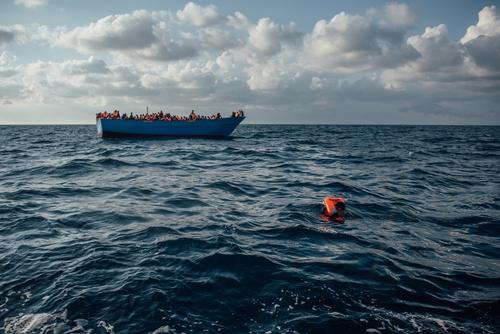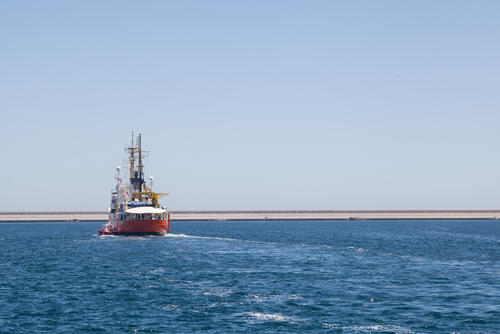- A year on from Italy’s decision to close its ports to humanitarian search and rescue, over 1,000 people have died and thousands more have been stranded.
- Criminalisation of aid has left commercial and military ships increasingly unwilling to rescue people at sea.
- MSF urges European governments to urgently support measures that will enable sufficient search and rescue capacity and safe disembarkation.
Amsterdam/Marseille – One year on from Italy’s decision to close its ports to humanitarian vessels and the first political stand-off over the fate of people rescued in the Central Mediterranean Sea, at least 1,151 vulnerable men, women and children have died, and over 10,000 more have been forcibly returned to Libya, exposed to additional unnecessary suffering. These avoidable deaths expose the human cost of reckless European migration policies, said Médecins Sans Frontières (MSF) and SOS MEDITERRANEE.
Between June 2018 and June 2019 in the Central Mediterranean:
10,000
10,
2,443
2,443
1,151
1,151
“The response by European governments to the humanitarian crisis in the Mediterranean Sea and Libya has been a race to the very bottom,” said Annemarie Loof, MSF Operational Manager. “One year ago, we implored European governments to put people’s lives before politics. We pleaded for a humane response; for an end to the dehumanisation of vulnerable people at sea for political gain. Yet one year on, the European response has reached deplorable new lows.”
The reality is, even with fewer and fewer humanitarian vessels at sea, people with little alternatives will continue to undertake this deadly sea crossing regardless of the risks.Frédéric Penard, Director of Operations, SOS MEDITERRANEE
Stand-offs at sea: the new “normal”
Since the Aquarius search and rescue vessel, operated by SOS MEDITERRANEE in partnership with MSF, was blocked from entering Italian ports one year ago, stand-offs in the Central Mediterranean Sea have become the new “normal”, with over 18 incidents publicly documented. These stand-offs add up to a combined 140 days, or over four months, that 2,443 vulnerable men, women and children have been stranded at sea while EU leaders debated their futures.
The fallout from the criminalisation of saving lives at sea is not only affecting humanitarian vessels but eroding the very principle of rendering assistance to people in distress at sea. Commercial and even military ships are increasingly unwilling to respond to those in distress due to the high risk of being stranded at sea and denied a place of safety to disembark. For commercial ships that conduct rescues, they are placed in an extremely difficult situation where they must risk a stand-off or return vulnerable people to Libya in violation of international law.
“One year ago, we warned that the dangerous and inhumane political stand-offs at sea should not set a precedent. Yet this is exactly what happened,” said Sam Turner, MSF Head of Mission for Libya and Mediterranean. “This political deadlock among European countries and their inability to put lives first, is only more shocking today as fighting continues to rage in Tripoli.”
The response by European governments to the humanitarian crisis in the Mediterranean Sea and Libya has been a race to the very bottom.Annemarie Loof, MSF Operational Manager
Pushed back to a cycle of violence
Since the end of April, vulnerable people have tried to flee Libya in increasing numbers, with over 3,800 boarding unsafe boats to attempt the crossing. While UNHCR and other organisations such as MSF have called for the humanitarian evacuation of refugees and migrants out of Libya since the start of the conflict in Tripoli, the reality is for every person evacuated or resettled this year more than twice as many have been forcibly returned to Libya by the Libyan Coastguard.
European leaders support these returns knowing exactly the cycle of exploitation, torture, sexual violence and arbitrary detention that these people are exposed to in Libya.
“The lack of humanitarian vessels in the Central Mediterranean during this period should put to rest the unfounded allegation of a ‘pull factor’,” said Frédéric Penard, SOS MEDITERRANEE's Director of Operations. “The reality is, even with fewer and fewer humanitarian vessels at sea, people with little alternatives will continue to undertake this deadly sea crossing regardless of the risks. The only difference now is people are nearly four times more likely to die compared to last year, according to the International Organization for Migration (IOM).”
One year since the first stand-off at sea MSF and SOS MEDITERRANEE continue to call on all EU member states to:
- Urgently provide proactive and sufficient search and rescue capacity, including competent and responsive coordinating authorities in the Mediterranean Sea to prevent unnecessary loss of life.
- End punitive actions against NGOs trying to provide lifesaving assistance in lieu of such capacity.
- Withdraw existing political and material support to the system of forced returns of refugees, asylum seekers and migrants to Libya to be placed in arbitrary and inhumane detention.
- Establish sustainable, reliable and predictable disembarkation systems offering places of safety where survivors will be treated humanely, provided with appropriate services and will be able to seek asylum.
Over the weekend of 9 and 10 June 2018, the Aquarius search and rescue vessel, operated by SOS MEDITERRANEE in partnership with MSF, rescued 230 people and received an additional 400 from Italian naval and coastguard ships. Although the rescue and transfers of these 630 people were initiated and coordinated by the Italian Maritime Rescue Coordination Centre (MRCC), the Italian authorities denied Aquarius authorisation disembark them safely in Italy as per international maritime law. Eventually, on 11 June, the Spanish government intervened and offered to let the Aquarius disembark in Valencia. Aquarius informed the Spanish and Italian MRCC that due to overcrowded conditions, safety and security concerns, Aquarius could only sail safely to Spain with a maximum of 100 survivors on board. On 12 June, after a 48 hour stand-by, and despite MSF’s and SOS MEDITERRANEE’s concerns about the humanitarian and medical impact of the sea journey to Valencia, the Italian authorities instructed Aquarius to transfer 524 people back to Italian ships and sail with the remaining 106 rescued on a four-day journey to Spain. On June 17, the Aquarius and Italian coastguard and navy ships disembarked all 630 people in Valencia, Spain.






